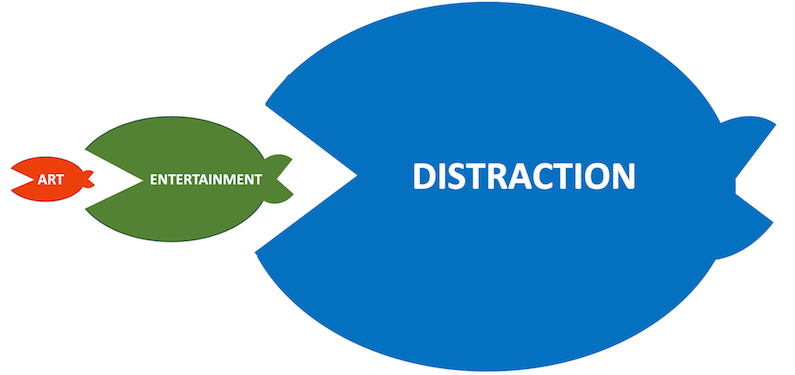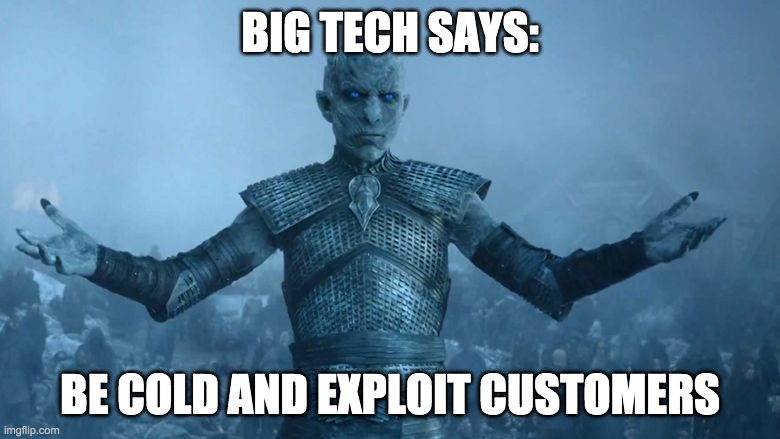Surviving the customer experience winter
By Mark Hurst • February 28, 2024
The AI field has a phrase, “AI winter,” referring to periods when declining investment in AI reveals a lack of faith in the technology. AI has gone through a few winters in the past 50 years, though obviously not right now.
I believe we’re in the middle of a “customer experience winter,” with no sign of it abating – yet. (As I’ll argue below, this too shall pass and spring will arrive someday.)
But first let me describe why I think we’re in winter.
A few years ago I wrote a sentence that expressed a closely held value, something that described how I thought the world worked – and indeed helped define my career.
Here’s what I wrote: Given a competitive environment, in the long run, the best customer experience will eventually win. This was in the final chapter of Customers Included, in which I stated my belief in listening to customers and delivering products and services that benefit them.
I’m sorry to say that that statement, for the moment, has been disproven. Looking at the trillions of dollars of market value that have concentrated into big tech – companies engaged in unethical surveillance, deceptive dark patterns, and a “growth at any cost” mindset – it’s become all but impossible to spot a connection between treating customers right and long-term success.
It’s cold comfort to find that I’m not the only one noticing.
From Software Has Eaten The Media, by Ed Zitron, Feb 27, 2024:
[P]ublic and private markets have become decoupled from the concept of “good business,” ruled instead by a hunger for the eternal growth of revenue and market share, regardless of whether they’re making a good product or treating humans as disposable in the process.
I remember when “good business” was a major factor in long-term success. Companies that delivered a superior product – that is to say, a better customer experience than their competitors – naturally rose to the top of their industries. This was especially the case online, where “competition was a click away.” (I say “was” since it is no longer the case; these days, big tech monopolies crush competition before it gains a foothold.)
Get Mark Hurst’s weekly writings in email: Subscribe. (Or join Creative Good.)
Sign up for this newsletter.
My own company, Creative Good, succeeded for a number of years while “good business” was still profitable. We advised hundreds of companies for about a decade, from the late ‘90s to the early 2010s, on how to (a) listen to customers, (b) translate that into product decisions, and (c) launch and maintain a great customer experience. Many clients saw key metrics skyrocket with this simple customer-inclusive process, and word spread. We did a brisk business in those years, helping companies thrive by treating customers better.
But at some point in the last few years, the markets changed. The needs of customers have been shunted aside. Ed Zitron again:
. . . [I]nvestors have become entirely disconnected from production, to the point that an alarming amount of modern business is done to please investors over customers, turning product strategy into a form of symbolic marketing. Our economy isn’t one that produces things to be used, but things that increase usage — and the result is the public decay of creativity and innovation.
I agree, though I’d offer a slight change. The “decay” has actually brought about a perverted kind of creativity and innovation, in which companies spend their time figuring out new and improved ways of tricking customers into acting against their own self-interest. As Zitron says, this is measured in terms of increased usage, not any actual benefit to customers.
Ted Gioia puts this well in a graphic in his recent column. From The State of the Culture, 2024, Feb 18, 2024:

Above we see the classic diagram of smaller fish being eaten by successively larger fish. Art is the smallest fish, and it’s being swallowed by Entertainment. But Entertainment, in turn, is being swallowed by Distraction. Later in the essay, under a heading of How Silicon Valley Views Culture, we see Distraction – already a pretty big fish – being swallowed by an enormous fish called Addiction. Thus we see that artistic integrity has been devalued in favor of advertiser-friendly content, which has been subsumed into endless-scroll platforms, which have been weaponized by addiction loops.
Silicon Valley has become very, very good at creating addiction loops in its products. I wrote about this in An addiction machine for our age (June 16, 2023), in which I describe the experiences of self-described addicts who now go to ITAA meetings. (ITAA stands for Internet and Technology Addicts Anonymous.) As I wrote:
The system is working as designed.
I mean that literally, not in some offhand snarky way. These systems are explicitly and intentionally designed for addiction, because addicted users generate maximal profit – and even those users who aren’t addicted still end up using the system more than they would otherwise.
As Silicon Valley goes, so goes the rest of the business world. Customer-hostile product development has become the default, and not just on social media platforms. Did you see the story a few days ago that M&M vending machines are secretly conducting facial recognition on customers? (I talked about this in my Dystopia update on Techtonic this week.) When you can’t even buy candy without being exploited by surveillance, you know that customer experience winter has fully set in.

The result of this winter is that any company authentically trying to create a good customer experience – that is, a company that has retained its integrity – is having a tough time of it. A good example is the independent review site House Fresh, which published a viral blog post on Feb 21: How Google is killing independent sites like ours.
Most other product review sites have been hollowed out by financializing leadership teams and turned into AI-generated spam factories. This, after all, is what is rewarded by Google’s algorithm. No wonder so much of the web is inundated with a sludge of AI-generated gibberish and SEO nonsense. The web isn’t being created for customers any more, because big tech has shunted customers aside. We’re in a CX winter.
Get Mark Hurst’s weekly writings in email: Subscribe. (Or join Creative Good.)
Sign up for this newsletter.
The good news is that nothing lasts forever. Someday, at some point, people will tire of the treatment they get from big tech. Arrogance, deception, manipulation – all of it is a losing strategy. Just look at how people in Glasgow reacted after they bought $40 tickets to a fake Willy Wonka exhibit, advertised with what appears to be an AI-generated brochure. (Here’s a gift link to the NYT article, Feb 27, 2024.) Customers’ indignation, their public shaming of the organizer, and a visit from the local police helped swiftly shut down the scam.
Now all we need is for people to understand the scam they’re enduring from the Silicon Valley monopolies. It may take awhile – I’ve been raising the alarm every week on Techtonic for over six years now – but a change will come. To modify a saying: Winter is coming . . . to an end.
In the meantime, there are teams here and there who still care about the customer. I know this because I still work with those clients, bringing a “customers included” mindset to build a great customer experience and enable the best long-term prospects for the company and customers alike. (See more on listening labs.)
If your team wants to include customers, or if you’re running an event that could use a rousing presentation on the importance of CX, drop me a line: mark@creativegood.com.
If we work together, we can bring about spring.
Creative Good members can post a comment on this column on our Forum, where our community discusses hundreds of topics.
Please join as a Creative Good member. You’ll get access to the Forum, you’ll be able to comment on this column, and you’ll help keep this newsletter going.
Upcoming appearances
• This Friday, March 1 in Jersey City: Night of Ideas. I’m moderating a panel with Damon Krukowski and Liz Pelly about streaming music in the age of big tech. Event is free but you have to register beforehand.
• This Saturday, March 2 in Jersey City: Total Trust screening, a documentary about the Chinese surveillance state. Doors at 7:30pm, film at 8pm. Q&A afterward with Albert Fox Cahn from Surveillance Technology Oversight Project.
Recent appearances and mentions
• A Few Things with James Barood (video podcast), Feb 2, 2024
• Quoted in the New York Post about Apple’s face jail, Feb 1, 2024
• I’m Not Yelling! I’m Dominican (podcast) – Jan 15, 2024 episode
Until next time,
-mark
Get Mark Hurst’s weekly writings in email: Subscribe. (Or join Creative Good.)
Sign up for this newsletter.
Mark Hurst, founder, Creative Good – see our services or join as a member
Email: mark@creativegood.com
Listen to my podcast/radio show: techtonic.fm
Subscribe to my email newsletter
Sign up for my to-do list with privacy built in, Good Todo
On Mastodon: @markhurst@mastodon.social
- – -